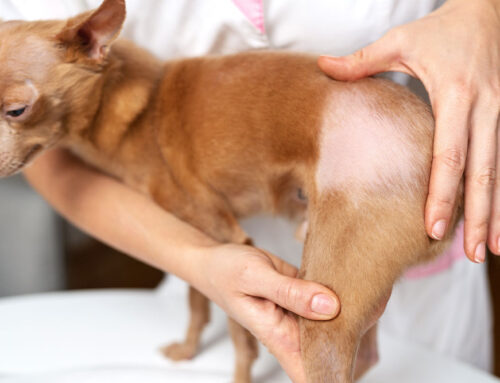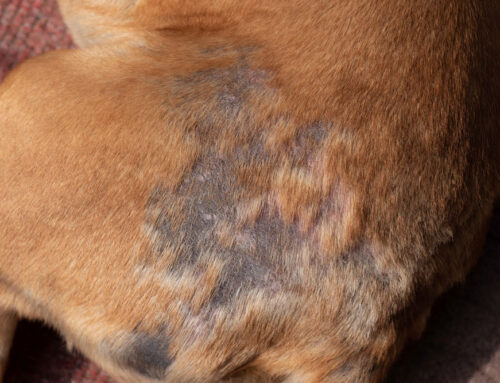The bacteria that cause leptospirosis thrive in warm climates, making Alabama a fitting environment for these pervasive pathogens. The leptospirosis incidence in the United States seems to be increasing, threatening your dog. A vaccine is available for dogs, but the inoculation is not considered a core vaccine (i.e., a vaccine that protects against endemic disease, diseases that are highly virulent or cause severe disease, or diseases that pose a public health risk). Our team at Tidmore Veterinary Hospital is here to help you decide if your dog is a candidate for the leptospirosis vaccine by educating you about this dangerous disease.
How is leptospirosis transmitted to dogs?
Infection most commonly occurs when your dog comes in contact with water contaminated by infected urine. The bacteria can enter through their mucous membranes or skin wounds. Other transmission methods include contacting contaminated soil, being bitten by an infected animal, and eating a contaminated carcass. The disease can also be passed through the placenta from a mother to her puppies.
Is my dog at risk for leptospirosis?
All dogs are susceptible to leptospirosis, but certain factors increase their risk, including:
- Signalment — Your dog’s age and gender may be a factor. Male dogs less than 5 years old seem to have a higher disease prevalence.
- Environment — Historically, rural dogs were more susceptible, because exposure to wildlife and livestock is a risk factor, but as urban areas encroach on wildlife habitats, city pets have become more at risk. Rodents, raccoons, skunks, opossums, deer, foxes, and possibly bats, now commonly seen in urban and city areas, can carry the disease without exhibiting signs.
- Location — Dogs living in the Midwest and Southwest United States are at higher risk.
- Water exposure — Dogs exposed to natural water sources and flooded areas are at higher risk. Flooding causes liberation of leptospires from urine-contaminated soil, resulting in a higher exposure potential.
- Weather — Cases are seen year-round, but leptospirosis is more commonly seen in the fall.
What should I expect if my dog is infected by leptospirosis?
Leptospirosis signs are non-specific and can vary in dogs. Different clinical syndromes may be exhibited, including:
- Acute kidney injury — The most common syndrome caused by leptospirosis is acute kidney injury, which causes signs including lethargy, decreased appetite, vomiting, and increased thirst and urination.
- Liver disease — Liver disease can occur alone or in addition to kidney disease in dogs affected by leptospirosis. Signs include lethargy, decreased appetite, vomiting, diarrhea, and jaundice (i.e., yellowish discoloration to the eyes and mucous membranes).
- Eye disease — Inflammation inside the eyes can occur in dogs affected by leptospirosis. The condition usually occurs in conjunction with kidney or liver disease.
- Lung disease — Bleeding in the lungs can occur in dogs affected by leptospirosis, resulting in respiratory distress. Typically, dogs affected by this condition also have concurrent kidney damage.
Diagnosing leptospirosis can be difficult, since the signs are generic. Two tests are available to help diagnose the disease, and both may be needed to confirm infection. Other diagnostics, such as blood tests, urine tests, X-rays and ultrasound, may be needed to assess organ damage. Once diagnosed, your dog will be started on an antibiotic treatment course, typically for at least three weeks. Dogs suffering from kidney and liver disease may need supportive treatment, such as intravenous fluids. Oxygen support also will likely be needed if your dog is affected by lung disease. Your dog’s prognosis will depend on how severely their organs are affected.
Am I at risk if my dog has leptospirosis?
While leptospirosis is a zoonotic disease (i.e., the infection can be spread between animals and humans), risk of transmission from dogs to owners is low. However, you should take certain steps to ensure you are not exposed.
- Wear gloves when handling your dog.
- Wash your hands thoroughly and frequently, especially after handling your dog.
- Administer the full antibiotic course that is recommended.
- Do not allow your dog to urinate in areas accessible to other people or pets.
Consider that you could be infected by the same source as your dog, so practice good hygiene at all times to help prevent this occurrence. Leptospirosis most commonly presents in humans as influenza, with signs that include fever, headache, nausea, and muscle soreness. See your physician immediately if you believe you have leptospirosis.
Should my dog be vaccinated for leptospirosis?

Current vaccines protect against four strains, or serovars, of leptospirosis. These include L. canicola, L. icterohaemorrhagiae, L. grippotyphosa, and L. pomona. Our American Animal Hospital Association (AAHA)-accredited team at Tidmore Veterinary Hospital can determine if your dog is a candidate for the leptospirosis vaccine based on their individual circumstances. Other methods to prevent infection include:
- Keeping your dog leashed, and preventing interaction with wildlife
- Not allowing your dog to swim in or drink from standing water sources, including those in urban areas
- Bringing bottled water and a water bowl on outings, and frequently offering your dog water
By making certain provisions, you can safeguard yourself and your dog from leptospirosis. If you would like to discuss whether your dog should be vaccinated for leptospirosis, do not hesitate to contact our team at Tidmore Veterinary Hospital to schedule an appointment.








Leave A Comment